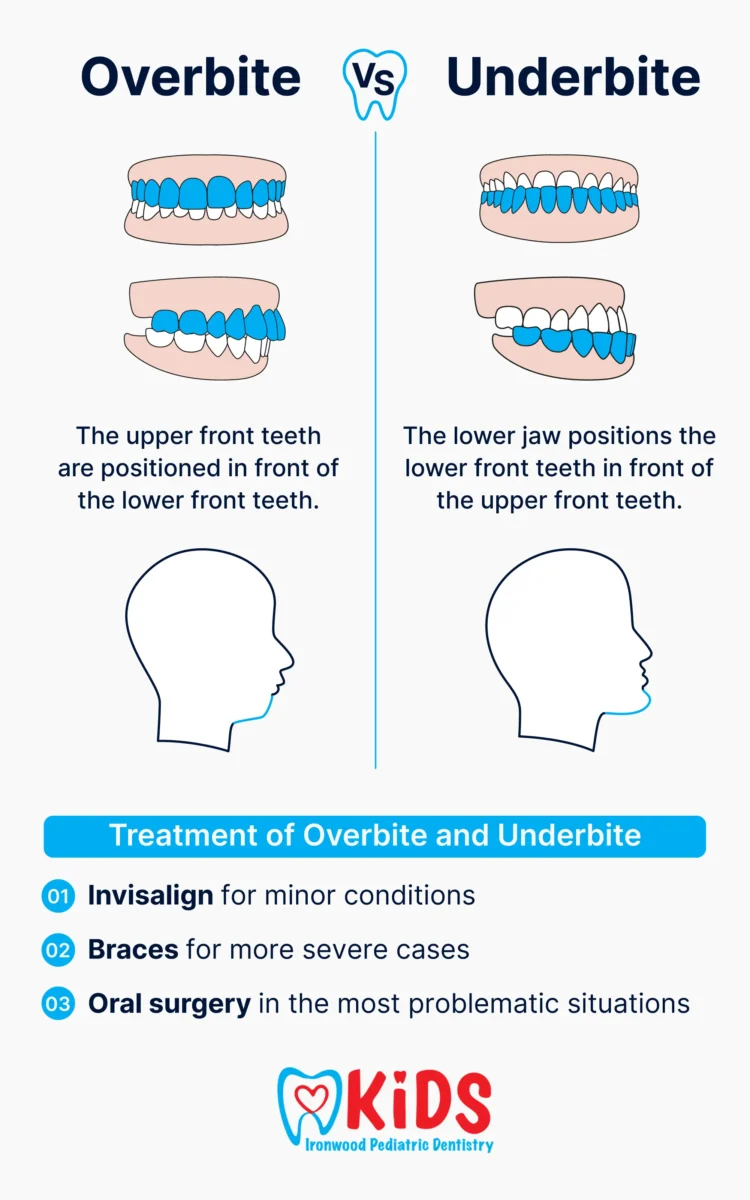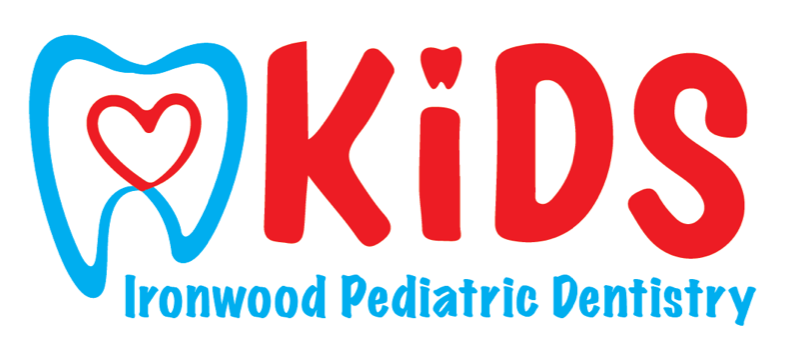Overbites and underbites are two common forms of what dentists and orthodontists call “malocclusions,” a condition that occurs when your upper or bottom teeth are out of vertical alignment with each other.
At Ironwood Pediatric Dentistry in Scottsdale, our child dentists and orthodontists treat overbites, underbites, and a full range of children’s dental issues, including tooth decay, wear, root canals, crowns, bridges, and orthodontics.
To learn if your child has overbite or underbite or how it can be treated, call (480) 422-4544 or contact us online to schedule an appointment or speak to our pediatric dental experts.
What is an Underbite Condition?
Underbite describes what happens when the lower jaw is positioned forward of the upper jaw. This results in the lower front teeth being positioned in front of the upper front teeth.
An underbite condition is not a simple tooth alignment issue. It is a condition caused by the relative skeletal development of the upper and lower jaws.
In a crossbite, the lower teeth may sit in front of the upper teeth. Unlike an underbite, it primarily affects tooth alignment rather than jaw positioning.
The importance of treating an underbite lies in avoiding its consequences. These include:
- Problems with biting and chewing
- Pain in the jaws, including temporomandibular joint (TMJ) pain
- Headaches and earaches
- Problems with speech
- Breathing problems associated with mouth breathing and sleep apnea
- Tooth wear, leading to enamel loss and tooth decay
- Gum disease
- Problems with facial appearance from protruding of the lower jaw
What is an Overbite Condition?
The opposite of an underbite, and overbite condition occurs when the upper front teeth are positioned in front of the lower front teeth.
A small amount of overbite is normal in a normal bite. The front teeth are used to cut down food, avoiding unnecessary chewing discomfort and excess enamel wear. This is a small advantage over having upper and lower front teeth perfectly aligned.
There are three similar conditions that are often confused with overbites: “deep bite,” “open bite,” and “overjet.” Each of these conditions has unique characteristics:
- Deep bite: an extreme degree of overlap between the front teeth. In a worst-case deep bite, the excessive overbite can lead to the bottom front teeth connecting the roof of the mouth.
- Open bite: a condition that involves a gap existing between the upper and lower front teeth.
- Overjet condition: an overbite with upper front that are bigger that the lower front teeth, also known as “buck teeth.”

Causes of Overbites and Underbites
Overbite and underbite conditions can have genetic origins. They manifest in underdeveloped or excessive upper or lower jaw growth.
In other cases, birth defects such as cleft palate or lip can contribute to underbite.
In addition, an underbite can develop from non-genetic factors, including certain childhood habits like tongue thrust when swallowing, thumb sucking, use of a pacifier for too long, trauma to the face or jaw, or a tumor in the jaw.
Non-genetic causes of overbite include bruxism, which consists of overused chewing muscles, teeth grinding, clenched jaws, or missing back teeth.
Treatment of overbite is important to avoid the following consequences:
- Problems with biting and chewing food
- Headaches and jaw pain, including TMJ pain
- Speech problems
- Tooth wear, including enamel loss that can lead to tooth decay
- Gum disease
- Breathing problems, including sleep apnea
- Sores and ulcers
- Appearance problems associated with a receded or “weak” chin
Treatment of Overbite and Underbite
Correcting overbites and underbites requires orthodontics. Some orthodontic treatment options that our child orthodontists at Ironwood Pediatric Dentistry might use include Invisalign treatment for minor conditions, braces for more severe cases, and oral surgery in the most problematic situations.
Invisalign Treatment Options
Although they are used most often for misaligned teeth, Invisalign clear aligners can also effectively treat minor underbite and overbite conditions.
Invisalign aligner trays are removable, but they need to be worn for approximately 22 hours daily during treatment. Treatment involves multiple sets of trays, each worn for about two weeks. When treating overbite and underbite, we sometimes use Invisalign accessories, including Invisalign attachments, rubber bands, and Mandibular Advancement with Enhanced Precision Wings.
At Ironwood Pediatric Dentistry, our certified Invisalign Doctors are qualified to administer Invisalign treatment options for misaligned bites in our child orthodontic patients.
Braces Treatment
Braces are an effective, traditional treatment for almost all orthodontic treatment needs, including overbite and underbite. We recommend braces when Invisalign treatment is impractical, such as for severely misaligned teeth.
Options for braces include traditional metal braces, lingual braces, and ceramic braces.
Orthognathic Surgery
For our adolescent and older patients, usually aged 14 to 16 for females and 17 to 21 for males, surgery may be needed for severe overbite and underbite cases.
Corrective jaw surgery is combined with other orthodontic treatments, including Invisalign or braces.
Upper jaw surgery may be needed when the patient has a significantly protruding or receding jaw. In this procedure, an oral surgeon cuts into the bone above the teeth, allowing the upper jaw to move forward to fit better with the lower teeth. Once this is complete, the surgeon uses plates and screws to fix the upper jaw into the desired alignment.
Lower jaw surgery corrects significant cases of a receding lower jaw or a protruding lower jaw. In this procedure, the oral surgeon cuts behind the molars and along the length of the jawbone to allow the lower jaw to move forward or backward. As with upper jaw surgery, once the jaw is in its new position, the newly aligned bite is held in place with plates and screws.
Request a Free Consultation for Overbite or Underbite
Overbite and underbite conditions do not go away on their own. Left untreated, they can become worse and lead to pain down the road.
Our Scottsdale pediatric dentists and orthodontists can help correct overbites and underbites, helping your child have a confident smile and optimal oral health for a lifetime. Call us today.
If you have any questions about these conditions or other oral health issues, call us at (480) 422-4544 or contact us online.
